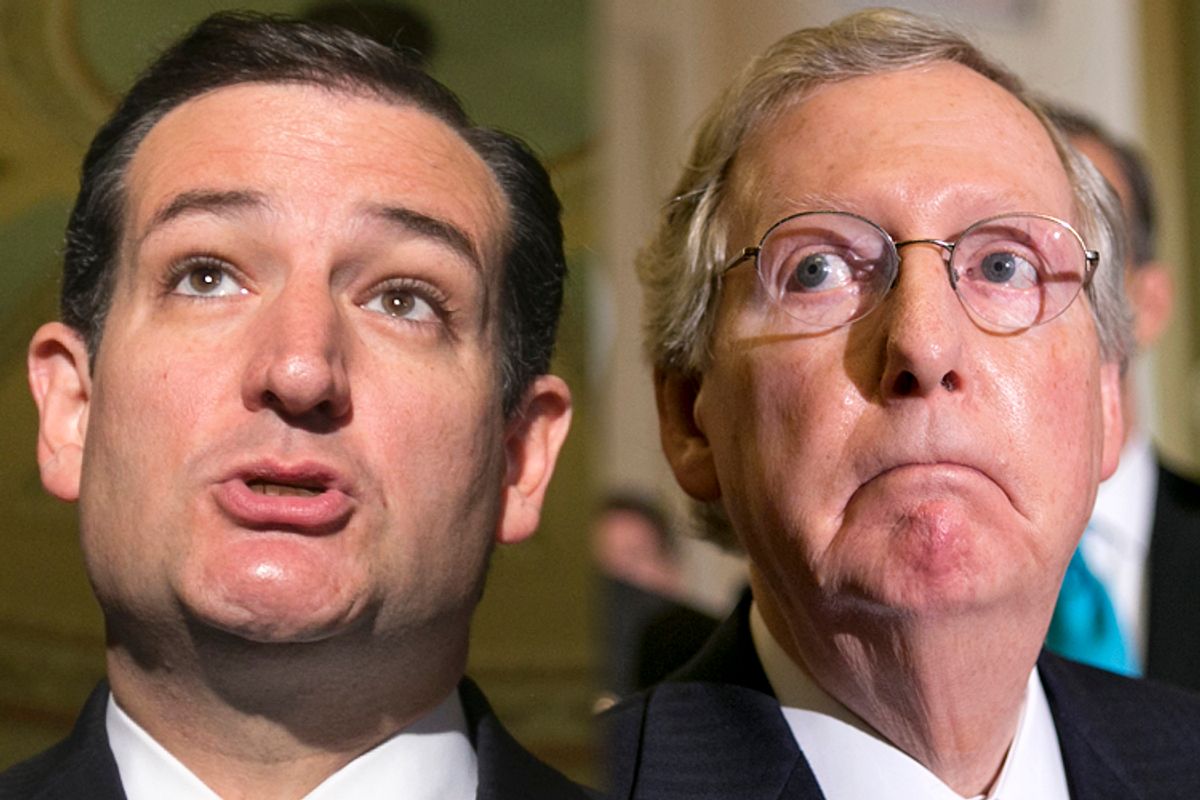Politics, as a rule, is terrible. It attracts terrible people and rewards their worst behaviors. It works at cross purposes, appealing to a person’s sense of idealism and then expecting them to corrupt it in order to achieve anything of substance. It’s a punishing slog that requires overcoming absurd and unnecessary obstacles to accomplish even the most basic of functions. And it’s only going to get worse.
Brian Beutler writes at the New Republic that the political climate as it exists today is about as good as it’s going to get for some time to come. Sure, we’re not actually getting anything done, save for the occasional executive order from President Obama, but we’re also not careening toward default and/or shutdown (though that could change before long). In the context of the dysfunction of last few years, this can’t be viewed as anything but a positive development.
That’s how low we’ve sunk: “not actively trying to sabotage ourselves” is counted as progress.
But get ready to sink lower. Let’s assume that the Republicans take control of the Senate in November, an outcome that is not inevitable, but certainly likely. The status quo will obviously be altered. Beutler lays out the options:
Republicans will either yield to 2011-style impulses again, and provoke a series of dangerous confrontations, or they'll content themselves with running the Democrats' current play, in reverse. Passing what legislation they can, expecting a veto. Letting Senate Democrats filibuster farther-fetched priorities. Continuing to propound various scandals and conspiracy theories.
Were I a betting man, I’d go with the regression to 2011-style crisis governance as the likelier of the two outcomes. We may be in a lull now, but that’s the direction an increasingly anti-government Republican Party is headed, and crisis governance is the only way to keep the Tea Party happy.
If the Republicans do win the Senate, it will be because conservative voters came out to support people like North Carolina’s Thom Tillis and Arkansas’ Tom Cotton. When the new Congress is sworn in next February, conservatives are going to want their agenda implemented – Obamacare repealed, debt limit frozen in place. With Obama in the White House, they’re not going to be able to realize that agenda through the normal legislative process.
Republicans managed to occupy themselves by passing endless Affordable Care Act repeal votes in the House, but even they’re weary of that gimmick and I suspect that seeing repeal after repeal fall victim to Democratic filibusters or Obama’s veto pen will not to do the trick for people like Ted Cruz. Cruz has already demonstrated that he’s not willing to accept half measures when it comes to repealing Obamacare, and reform bills that merely undermine the law would seem to fall in that category. Lately he's been talking up the government shutdown he precipitated as a political victory for the Republicans.
He’ll also have new allies who are attuned to the Tea Party ethos and will not necessarily fall in with what the establishment wants. “To backers of the Tea Party hopefuls, it is the willingness of their candidates to break with the establishment that makes them so attractive,” Carl Hulse wrote in the New York Times. “Conservative activists view many in the Republican hierarchy as timid, insufficiently conservative and complicit with Democrats and Washington lobbying interests. They yearn to shake the power structure and believe the party could benefit.”
The question ultimately comes down to whether the Senate Republican leadership would risk open rebellion within the caucus in order to pursue a less destructively incompetent form of governance. Mitch McConnell was opposed to Cruz’s shutdown scheme, but not to the idea of taking hostages in order to extract policy concessions. Assuming he survives against Allison Lundergan Grimes and is elected majority leader, he could very well revive the tactic, particularly if the Senate and House can put up a unified front against Obama.
The Republicans will also be keenly aware of the ticking clock. Control of the Senate could very likely be a short-lived situation as the 2016 map will be as bad (or worse) for Republicans as it is for Democrats this cycle. The pressure to implement conservative agenda items before Democrats have a chance to take back control will be enormous.
Republicans were already frustrated when the leadership abandoned the crisis governance tactic earlier this year. And I doubt that conservatives, after seizing full control of the legislature for the first time in eight years, will be content to use the legislative process to rack up political victories. They’ll want results and they’ll want them quickly. Add all those things together and you can start to see how Republicans will be tempted to resume their strategy of creating and exploiting government dysfunction, and how our already terrible politics will only get worse.

Shares